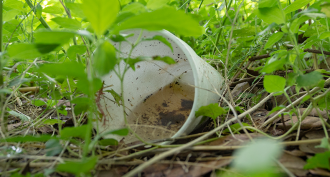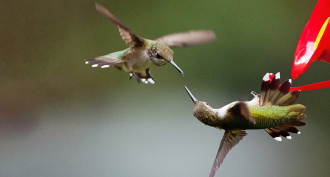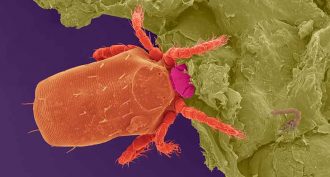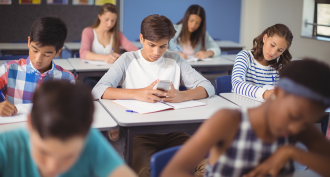
Alison Pearce Stevens is a former duck wrangler, beekeeper and forever science geek who specializes in writing about science and nature for kids. She lives in the Midwest with her husband, their two kids and a small menagerie of cuddly (and not-so cuddly) critters. She writes for Science News Explores, Highlights, ASK (Arts and Sciences for Kids) magazine and National Geographic Kids' Books. Her next book, Rhinos in Nebraska, comes out in 2021. She is also an avid gardener who can often be found in her yard, checking out the critters that call it home.

All Stories by Alison Pearce Stevens
-
 Materials Science
Materials ScienceTrees may become the key to ‘greener’ foam products
Scientists have made an environmentally friendly alternative to plastic-based foams to help keep things cool.
-
 Tech
TechOcean energy could be the wave of the future
Energy systems that turn the power of ocean waves into electrical energy could be on the horizon — or pumping away near the sea floor.
-
 Psychology
PsychologyArt can make science easier to remember
Students who learn science using art remember what they learned longer than those in regular classes.
-
 Chemistry
ChemistryShape-shifting chemical is key to new solar battery
Storing solar energy is a challenge. A new, shape-shifting molecule may provide a solution.
-
 Health & Medicine
Health & MedicineTeens who play violent video games aren’t any more violent
A careful new study shows that teens who play violent video games are no more aggressive than other teens.
-
 Psychology
PsychologyWhat part of us knows right from wrong?
Our conscience may have evolved from our need to cooperate. Scientists are learning where the brain’s moral centers are, and how they make us human.
-
 Animals
AnimalsSome male hummingbirds wield their bills as weapons
The shape of some hummingbird bills may reflect a trade-off between drinking nectar and fighting off the competition.
-
 Environment
EnvironmentRenewable energy might be able to green a desert
Computer models show that placing wind turbines and solar farms in deserts could increase how much rain falls in nearby areas.
-
 Health & Medicine
Health & MedicineChigger ‘bites’ may trigger an allergy to red meat
Some people develop a food allergy to red meat, and researchers suspect chiggers bites are to blame.
-
 Health & Medicine
Health & MedicineHere’s what puts teen drivers at greatest risk of a crash
Most teen car crashes trace to distraction and a driver’s inexperience. New studies point to how easily we can be distracted and by which activities.
-
 Psychology
PsychologySmartphones may serve as digital security blankets
In a new study, students in awkward social situations experienced less stress if they had — but didn’t use — their smartphones.
-
 Psychology
PsychologyPhones in the classroom hurt everyone’s grades
When students use electronic devices in the classroom, their school performance may suffer. And so might their classmates’ grades, a new study finds.